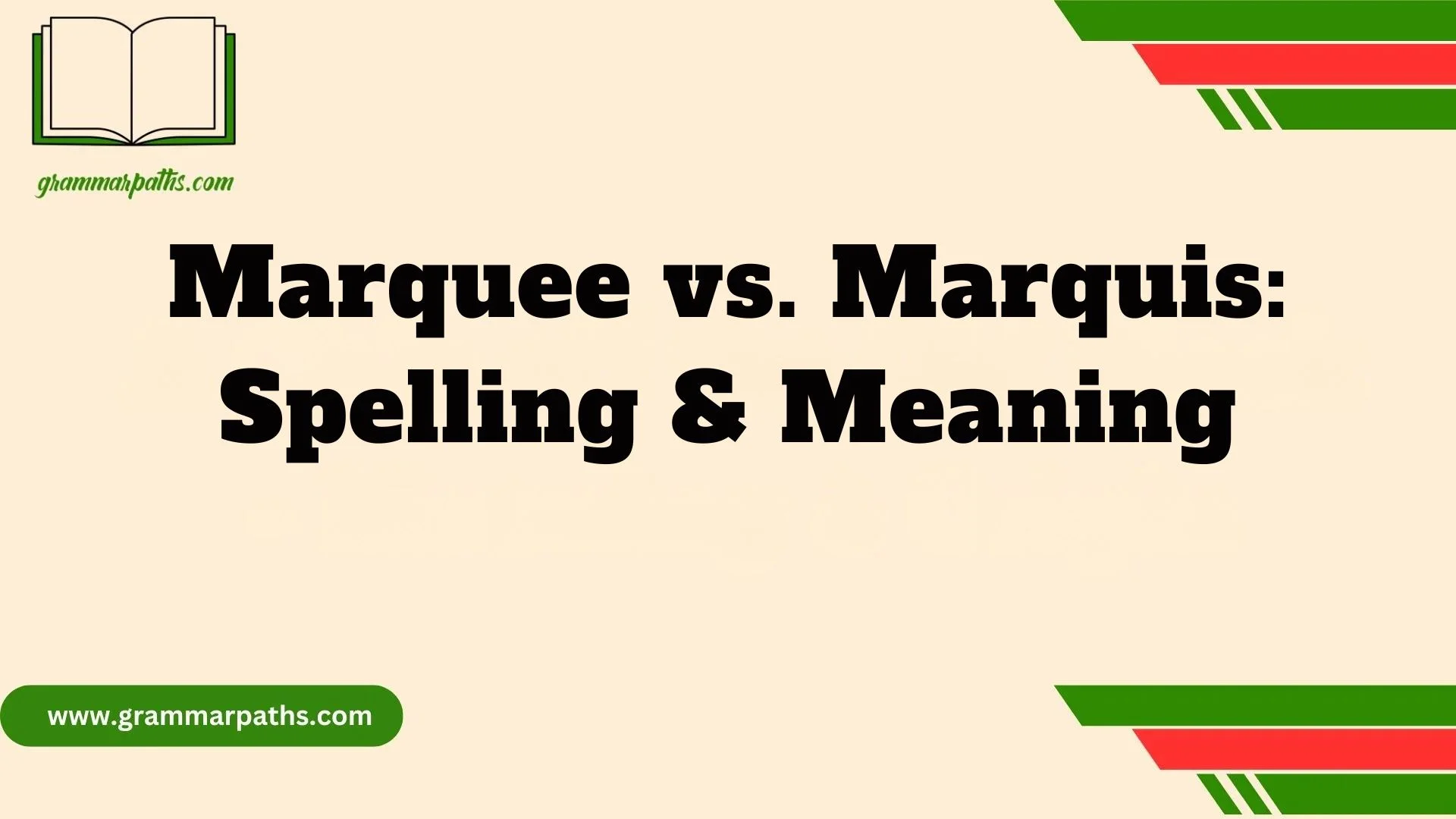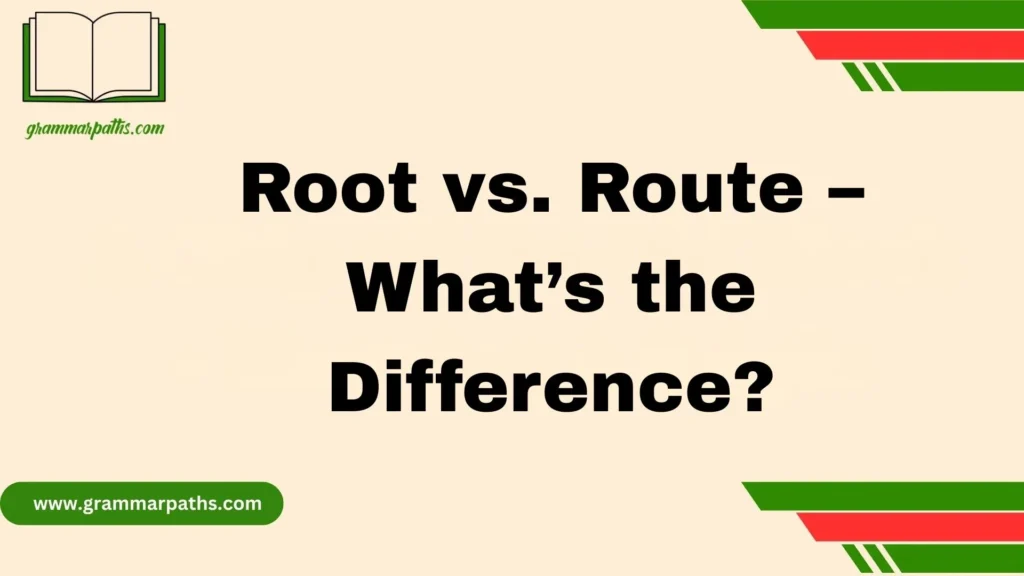If you’re learning English or working to become a better writer or speaker, you’ve probably run into tricky homophones—those words that sound the same but have totally different meanings and spellings. One common pair that trips people up is “marquee” vs. “marquis.” They may sound nearly identical, but their meanings are completely different.
A marquee is something you might see outside a theater or stadium—a large sign, a fancy tent, or something designed to be flashy and attention-grabbing. It’s all about presentation and prominence.
A marquis, on the other hand, has nothing to do with structures or signs. It’s a noble title from European history—think aristocracy, royal courts, and social rank. It’s about people and prestige, not tents or events.
If you want to communicate clearly and confidently, it’s worth taking the time to understand the difference. I’ll admit—I used to mix them up all the time in my own writing. What finally helped was finding a simple, clear guide full of examples, explanations, and real-life usage. Once I saw them used in context, everything clicked.
Since then, my writing has felt a lot sharper and more precise. Once you get the hang of marquee vs. marquis, you’ll feel that same confidence—and you’ll never second-guess yourself again.
Hook & Introduction: Why This Confusion Happens So Often
Imagine writing about a grand tent for a wedding and referring to it as the marquis. Or describing a nobleman but calling him the marquee. You’d sound off—possibly even get laughed at at the ceremony! That’s because both words have French heritage, similar spellings, and evoke elegance. But their meanings are miles apart. This confusion commonly pops up in:
- Journalism and marketing, where tempting metaphors can trip writers
- History and fiction, where nobility titles matter
- Event planning, where stakes are real
By the end of this guide, you’ll effortlessly distinguish these two words. You’ll understand definitions, history, usage, pronunciation, tips, memory tricks, plus real-world examples. Let’s get started!
What Is a Marquee? Deep Dive Into the Meaning and Use
Definition and Etymology of “Marquee”
Marquee refers to two main ideas:
- A large tent often rented for weddings, festivals, or corporate event
- A sign above a theater or venue that lists show names
It comes from the Old French marquise, originally meaning a tent or canopy. Dictionaries agree on its dual meanings:
- Oxford: “A large tent used for social or commercial functions” + “a sign over a theater”
- Merriam-Webster: Defines both the event tent and the theater sign
That dual identity explains the many ways you might encounter the word today.
Usage in Different English Dialects
North American English
In the U.S. and Canada:
- You see marquee on theaters and cinemas:
“Look at the marquee—guess who’s headlining tonight?” - It goes metaphorical in sports and entertainment
“That’s a marquee matchup between Lakers and Celtics.”
British English and Commonwealth Regions
In the U.K., Australia, and New Zealand:
- Marquee usually means the tent:
“They booked a marquee for the garden party.” - Though rarer, it can also refer to signage—especially in older venues.
Extended Metaphorical Usage
The word marquee often jumps from physical objects to symbolic prestige. It appears in:
- Marketing: “marquee brand,” “marquee sponsor”
- Sports rosters: “marquee player,” “marquee signing”
- Corporate events: “marquee keynote speaker”
Each implies prominence, importance, or prestige.
Examples in Real Sentences
- “The band’s name shines from the neon marquee above the theater.”
- “They set up a white marquee in the back garden for the reception.”
- “Signing that star striker was their marquee move this season.”
- “We need a marquee sponsor to boost event awareness.”
What Is a Marquis? Unpacking the Noble Title
Definition and Historical Roots
A Marquis is a title of nobility. Historically, it ranks:
- Below a Duke
- Above an Earl (or Count in continental Europe)
Origin:
- Latin marchio – “ruler of a border region”
- Old French: marquis
- English borrowed the term in medieval times
That tells you: a Marquis governed frontier areas in feudal Europe.
The Role of a Marquis Throughout History
- Medieval Europe: Borderlands required strong rulers—marquises commanded defense and settlement
- British peerage: Introduced under Edward III in the 14th century; later officialized at different times
- French nobility: Distinguished from dukes; many historical figures—like the Marquis de Lafayette—carry it
Modern Cultural References
The title shows up in:
- Literature (The Three Musketeers, Les Liaisons Dangereuses)
- Historic biographies (Marquis de Sade, Marquis de Laplace)
- Period dramas
Today, in the UK, it’s largely ceremonial and rare—but still recognized.
Regional Variation: Marquis vs. Marquess
| Term | Region | Use |
| Marquis | France, US | Traditional French title; English adopted |
| Marquess | UK, Canada | Preferred in British peerage |
So a British Marquess is equivalent to a French Marquis, just a spelling shift reflecting regional usage.
Pronunciation Differences
- Marquis: /ˈmɑːrkwɪs/
- Marquess: /ˈmɑːkwɪs/ (hidden ‘e’ sound)
Many mispronounce marquis as /mərˈkiː/—like “mar-KEE.” That pronunciation actually applies to the cinema sign meaning! Context matters.
Examples in Context
- “The Marquis of Queensberry established boxing rules in 1867.”
- “Marquis de Sade wrote controversial works in the late 1700s.”
- “In the novel, the Marquis arrives at court wearing a velvet coat.”
- “Canadian Marquess titles sometimes get ‘anglicized’ in modern records.”
Marquee vs. Marquis: The Real Differences That Matter
Side-by-Side Definitions
| Word | Primary Meanings |
| Marquee | 1. Event tent 2. Theater sign 3. Figurative: prominence |
| Marquis | Noble title, ranking below duke and above earl/count |
Usage Comparison Table
| Feature | Marquee | Marquis |
| Meaning | Party/event tent or sign | Noble title |
| Origin | French marquise (tent) | Latin marchio → French marquis |
| Common Use | Weddings, festivals, sports, business | Medieval, historical nobility, literature |
| Pronunciation | /mɑːrˈkiː/ or /mɑːrˈkeɪ/ | /ˈmɑːrkwɪs/ |
| Today’s Use | Theater marquee signs, “marquee event” | Historical or formal titles |
| Typical Mistake | Called “marquis” tent mistakenly | Mistyping nobility as event equipment |
Common Errors and Why They Happen
- Spelling overlap: both start with marq- and end in -is or -ee
- French roots give them faux-similarity
- Homophones in speech-based tools (speech-to-text, AI)
- Writers in a hurry often write the easy marquis instead of the correct marquee
When to Use Marquee vs. Marquis: Context Is Everything
Context Clues That Help Decide
- Is the subject a place, event, or person?
- Are nearby words historical or crowd-related?
- Look for context verbs:
- “attended,” “sponsor,” “lit up,” etc., suggest marquee
- “inherited,” “noble,” “title of,” etc., suggest marquis
Situational Quiz: Choose the Right Word
Pick the correct word to complete each sentence:
- They set up a ___ tent for the garden wedding.
- The ___ of Bath invited guests to his estate.
- The timeslot had a ___ matchup on TV.
- Flowers lined the entrance under the ___.
- The ___ gave a long speech at court.
Answers: marquee, marquis, marquee, marquee, marquis
Table: 10 Commonly Confused Sentences Fixed
| Incorrect | Correct | Why It’s Correct |
| The marquis tent flooded in rain. | The marquee tent flooded in rain. | It’s a tent. |
| We saw the marquee outside the theater. | We saw the marquee outside the theater. | Correct, early example, no error. |
| The marquee attended the gala event. | The marquis attended the gala event. | Nobleman, not tent. |
| The marquis club signed a new deal. | The marquee club signed a new deal. | It’s declaring prominence. |
| A marquis sign showed today’s show. | A marquee sign showed today’s show. | That’s a theater sign. |
| They planned a marquis wedding. | They planned a marquee wedding. | Tent, not a nobleman. |
Idiomatic & Metaphorical Usage: The Hidden Layer
“Marquee” in Business, Sports, and Pop Culture
- Business: “marquee client,” “marquee sponsor”
- Sports: “marquee matchup,” “marquee signing”
- Pop culture: “marquee brand,” “marquee performance”
It signals importance or prestige—often headline-worthy.
“Marquis” in Literature and Satire
- Used in classics: Dangerous Liaisons has characters like the Marquis de Merteuil
- Gothic: Marquis de Sade
- Satirical: 18th-century pamphlets mocking nobility by name-dropping Marquises
Even today, authors use Marquis to evoke aristocratic status.
Expert Linguistic Notes: Why the Confusion Persists
Linguists’ Take on Homophones and Cognates
French-derived words in English often confuse speakers:
- They appear formal and exotic
- Spellings can overlap
- Cognates and homophones like marquis/“marquee” create mix-ups
AI and Grammar Tools Mistaking the Terms
Grammarly, Word’s editor, and some AI models occasionally mix the terms. Here’s why:
- They rely on statistical guesses, not context
- If you never correct them, they keep making errors
- Manual proofreading remains critical
Always trust your knowledge—and use the tools as checks, not dictators.
Pro Tips: How to Never Mix These Words Up Again
Memory Hacks
- Marquee has two “e”s—think event tent, theater sign.
- Marquis ends with “is”—like is a nobleman.
Mnemonic Devices
- Picture a neon marquee flashing above your head at a concert
- Think of a knight saying, “I am (is) the Marquis!”
Writer’s Checklist Before Publishing
- Does it refer to an event or a person?
- Are there thematic indicators like “tent,” “noble,” “sponsor”?
- Check pronunciation hints: NEON vs. NOBILITY
- Run quick find | replace search for both words
- If unsure, consult a trusted dictionary
Summary: Quick Recap You Can Bookmark
- Marquee = tent or sign (e for event)
- Marquis/Marquess = noble title (noble is)
- Double-check using spelling and context clues
- Pronunciation difference matters when reading aloud
- Stick to one usage: event/prominence vs. nobility
Frequently Asked Questions (FAQs)
Is “marquee” ever used to refer to a person?
Strictly no. It might describe someone figuratively (“marquee player”), but never as a person’s name or title.
Why does British English use “marquess” instead of “marquis”?
“Marquess” fits British spelling standards. American and French usage often prefers “Marquis.” Both refer to the same rank.
Are there female versions of “marquis”?
Yes. In British tradition, the wife of a Marquess is a Marchioness. In French, “Marquise.”
Can “marquee” be used metaphorically in British English?
Absolutely. You’ll hear “marquee athlete” or “marquee event” across English-speaking regions.
Do Americans ever use “marquis” anymore?
Rarely. Historical texts, literary names, and certain traditions still carry the title, but it’s uncommon in modern speech.
Conclusion: You’re Now Fluent in Marquee vs. Marquis
You’ve navigated definitions, history, pronunciation, real-world usage, and memory tricks. Now you confidently know when to call something a marquee and when someone is a marquis. Like a master wordsmith, you’ll spot errors in others’ writing, nail down the right word for your audience, and never blend these terms by mistake.
So keep this guide handy, run your writing through the checklist, and use your newfound knowledge. You’ve leveled up your vocabulary—and your credibility!
“Clarity is the lens through which precision shines.”
Feel free to share this post, test your friends or colleagues with the quiz, or drop a comment with another pair of words you’d love to untangle next.

Mia Rose is the passionate writer and founder of GrammarPaths.com, a resource dedicated to helping learners master English grammar, idioms, and writing skills with ease. With a deep love for language and years of experience in teaching and content creation, Mia simplifies complex grammar rules into clear, practical guides that readers can instantly apply.












